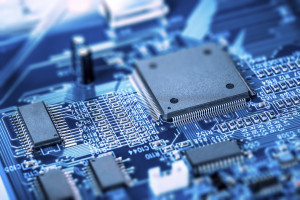When one thinks of electronics, water is probably not the first thing that comes to mind. But without ultrapure water (UPW), the manufacturing of the high-tech semiconductors needed for today’s laptops, tablets and smartphones wouldn’t be possible.
Why the need for such purity?
Semiconductors, the foundation of modern electronics, are the wafers from which microchips are cut. And when it comes to making these semiconductors, ultrapure rinse water is absolutely essential.
That’s because microchips are built in layers, and between each step in the manufacturing process they must be thoroughly washed and cleaned of all solvents and debris, one layer at a time.
Here’s why. The pathways on these microchips are incredibly fine. Narrower than the wavelengths of visible light, they can only be seen using powerful electron microscopes.
Because of this, even the tiniest amount of debris is detrimental to their integrity. Therefore, the chips have to be washed with ultrapure water – a specialized type of water significantly more pure than purified drinking water or even distilled water.
Ultrapure semiconductor rinse water is highly filtered deionized water, and unlike regular water contains no electrolytes. It is the purest of pure water, comprised of nothing but water molecules.
Sodium and potassium, bacteria, organic compounds, metallic impurities and anionic compounds must all be removed before it can qualify for use as semiconductor rinse water.
Further benefits of ultrapure rinse water
In addition to being used during semiconductor manufacturing, ultrapure rinse water is also used to rinse the completed electronic components.
After processing, capacitors and transistors require ultrapure water in order to properly cool. If the water used in this phase were to contain any impurities, the product would become stained and corroded, rendering them unusable.
Additionally, these same contaminants can clog the machinery used to manufacture these components, resulting in damage that is extremely costly to repair.
The other benefit of ultrapure rinse water is that it significantly reduces the amount of wastewater created in the cooling and cleaning processes. That’s because ultrapure rinse water can be recycled for use in the cleaning and cooling phases.
Requirements for ultrapure water in semiconductor manufacturing
The standards for Ultrapure Water in semiconductor manufacturing are even more stringent than those for body injectables.
Ultrapure semiconductor rinse water must be 100% neutral, with the highest resistance possible: 18.2 megaohms and its Total Organic Compounds (TOC) measurements cannot yield more than 50 parts per billion.
Only 1-2% of water purification companies are able to achieve this outcome.
A UPW system optimizes purification in the following sequence:
* Next, organic molecules are broken down via UV purification
* Polishing cartridges then remove additional ionic and organic contaminants below trace levels
In order to achieve the most reliable ultrapure rinse water and meet the standards established by Semiconductor Equipment and Materials International (SEMI), specialized engineers must be well versed in the hyper-precise low TOC specifications required to design one of these membrane systems.
Furthermore, to achieve the requisite standards of purity, validation support is critical. That’s because a UPW system requires precise and regular calibration and a rigid servicing schedule.
In the world of high-tech electronics manufacturing, ultrapure rinse water is essential. That’s because ultrapure rinse water ensures the production of the best quality semiconductors and reduces operating and maintenance costs of the manufacturing equipment. It can also be repurposed in the cooling and cleaning processes.
If you think that sounds far too technical and specialized, this may put things in perspective: without ultrapure rinse water, your smartphone wouldn’t exist.
So the next time you’re using an app to find a parking spot in Tuscaloosa, Alabama or a B&B in Lancaster, Pennsylvania, you’ll have water to thank. Pure and simple!
We’ll do more than give you a quote—we’ll visit your site to analyze your industrial water needs.


Follow Us